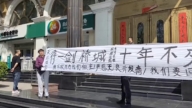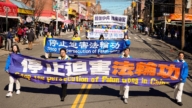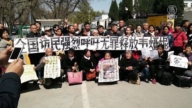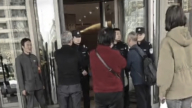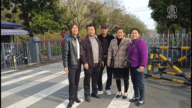【新唐人2014年09月06日讯】深圳民间法律工作者汪龙控告中国联通封锁谷歌案,近日在深圳福田区法院审理完毕,但是没有做出当庭宣判。事后,汪龙投诉,法院职员强迫他在与陈述不符的笔录上签字,他质疑法院涉嫌存在违法问题。
汪龙表示,从5月份开始,他使用的中国联通网路就无法访问Google、Gmail等网站,于是他将中国联通和中国联通深圳分公司告上法庭。
这起诉讼被称为“封锁Google全球第一案”,由深圳福田法院在9月4号开庭审理。被告中国联通深圳分公司只是委托律师出庭,中国联通则没有人出席。
汪龙:“在审判过程中,审判员问了被告代理员一个问题,你们的网路能不能访问Google这些网站?被告代理人他也一时没办法回答,也不知怎么回答。后面举了一个例子说,他在律师所里面用电信的宽频是访问不了Google的。但是这个时候,被告代理人还没有把话说完,审判员就说,‘无法访问,但是与运营商无关’。相当于代替被告回答了。”
汪龙表示,代理审判员白松灵,让记录员按照“无法登录但与运营商无关”的大意记入笔录,将不属于当事人回答的内容,当作当事人的回答,记入了笔录。
汪龙对此提出抗议,要求代理审判员回避。但却遭到一位法官称这是“院长的口头决定”而驳回。
庭审结束后,法院没有立即作出宣判。
汪龙表示,庭审时的蔡姓记录员,并不是福田法院的法官或职员,开庭时也没有佩戴证件;所做的笔录内容也与他的陈述不符,所以他拒绝在笔录上签字。
之后,蔡姓记录员强行要汪龙签字,并破口大骂,甚至要关门对汪龙采取暴力行动。汪龙只得现场报警,蔡姓记录员才作罢。
其实,在开庭之前,汪龙就接到深圳龙岗区国保的电话,说在两点钟约见他。汪龙拒绝后,把消息在推特上发出,并写道:“如果在本信息发出后的6个小时内我没有再次更新,说明我有可能被强迫失踪了,请持续关注!”
汪龙:“这个官司能不能告得赢,大家心里都明白,甚至就像很多网民所说的,这个官司肯定是告不赢的。但是我认为这个官司意义在于体现,通过我去起诉,包括开庭一系列的过程,来告诉大家公民是有这个权利的,是需要主张这个权利的。”
汪龙认为,如果没有人去做,公民的这个权利肯定不能实现;如果所有人都去主张的话,权利才可能实现。
广州自由民主人士徐琳:“官司打赢不是最主要的。他也是通过这件事情唤醒大家这种抗争意识,让大家更加了解这个专制的邪恶,同时用他的行动带动大家。”
广州自由民主人士徐琳表示,汪龙的行为是对言论封锁的一种抗争。通过他的这种抗争,网民知道政府在遮罩很多网站。这可能会引发网民的好奇心,想法了解更多的国外媒体,从而打破政府的管控。
大陆律师刘先生指出,中国没有一条法律规定互联网不能访问境外网站,只是说不能上所谓的危害国家安全和淫秽色情网站。显然,Google、Gmail不属于此列,但法院肯定会找到借口,为国家封网的行为背书。
大陆律师刘先生:“明文规定的法律或者法规也好,司法解释也好,没有一条法律依据,给他们这些政府部门屏蔽相关的网站,来提供支援。”
刘律师说,中国有一些法律的解释权就在法院,而且法院还会利用娴熟的“踢皮球战术”搪塞网民。例如,之前有上海网民做过类似的起诉,但上海法院以网民能“通过代理服务器访问”为借口,直接判网民败诉。
采访/田净 编辑/宋风 后制/肖颜
First Lawsuit against Mobile Censorship Involves Court Perjury
Wang Long, a legal worker in Shenzhen, filed a lawsuit against China Unicom, the State-owned mobile service provider, for blocking access to Google. The hearing was conducted in Shenzhen Futian District Court. A decision has yet to be announced by the court. Wang Long complains that court staff forced him to sign a record inconsistent with his statement. He suspects the court is violating the law.
Wang Long indicates, he brought both China Unicom and the Shenzhen Branch of China Unicom to court for lack of access to Google’s online services such as Google and Gmail since May.
This lawsuit is known as the first against China’s censorship of Google. Shenzhen Futian Court conducted the hearing on Sept. 4.
Shenzhen Branch of China Unicom was represented by a lawyer, but no one was present on behalf of China Unicom.
Wang Long: “During the hearing, the judge asked the plaintiff’s agent, ‘Can your network access Websites such as Google?'"
The agent could not answer right away and did not know how to answer this question. He gave an example: the broadband telecommunications in his law firm has no access to Google. But, before he could finish his sentence, the judge said, “Having no access, but is irrelevant to the operating vendor." It is simply answering on behalf of the plaintiff."
Wang Long indicates that the acting judge Bai Songling asked the court registrar to record “Having no access, but is irrelevant to the operating vendor."
The statement not belonging to the plaintiff was recorded as it was.
Wang Long protested by asking the acting judge to be excused.
Another judge dismissed his request by saying that it is the verbal decision of the court president.
The court did not immediately make the decision on the hearing day.
Wang Long points out, the registrar surnamed Tsai is not a judge or staff member of Futian Court, and did not wear ID. Wang Long refused to sign the record as the transcripts were made inconsistent to his statement.
Registrar Tsai demanded Wang Long sign the paper, scolded him and even attempted to conduct violence on Wang Long by shutting the door.
Tsai finally stopped when Wang Long called the police.
In fact, Wang Long had received a phone call from national security in Shenzhen Longgang District before the hearing asking to meet him at two o’clock.
Wang Long rejected the meeting and wrote on Twitter: “If I do not update again within six hours after this message, I may have been forced to disappear. Please pay attention."
Wang Long: “Nobody knows if this case will win, or like many mobile phone users have said, there is no way this case will win.
But I think the significance of this lawsuit, including the process of the hearing, is to tell people that citizens have the right and should insist on the right."
Wang Long believes, citizen rights can only be achieved when everyone advocates the right.
Guangzhou activist Xu Lin: “It is not about winning the case. He tried to wake up our conscience to resist and to learn about the evilness of this tyranny. Meanwhile, he tried to show an example with his action."
Xu Lin believes Wang Long’s behavior is a protest against blocking free speech. His protest reveals the many masks of mobile websites by the government. This may trigger mobile phone users’ curiosity to break the censorship and learn more about foreign media.
Chinese lawyer Mr. Liu explains, there is no legal regulation on accessing foreign Websites, but only on those which endanger national security or allow pornography.
Obviously, Google and Gmail do not belong to any of them.
But the court will certainly find any excuse to endorse the Internet blockade.
Lawyer Liu: “There is no legal support for these government agents to mask these Websites, whether it is the law or judicial interpretation."
Lawyer Liu indicates that courts reserve the right to interpret the law in China. Courts also prevaricate and pass the buck around.
For example, Shanghai court once ruled against a similar lawsuit with the excuse of “gaining access through a proxy server."
The mobile phone user lost the case.
Interview/TianJing Edit/SongFong Post-Production/XiaoYan




